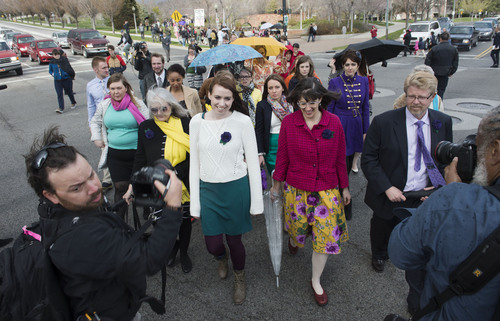This is an archived article that was published on sltrib.com in 2014, and information in the article may be outdated. It is provided only for personal research purposes and may not be reprinted.
As an LDS graduate of Harvard Divinity School, which trains clergy and religious scholars, I might be expected to align with those who believe the LDS Church should ordain women. I do not. While I respect their opinions and desires, I do not share them. More importantly, I am uncomfortable with their methods for seeking change in the church, which work well for other causes like civil rights campaigns in the public square but are, in my view, inappropriate for advancing personal views in the LDS Church.
First, I do not support the creation of any outside organization to publicly agitate on internal church matters. As a member of the church, I have committed to sustain its leaders. "Sustain" need not mean "always agree with," but to my mind, surely it means not creating a publicity-seeking organization in direct opposition to the church's position, inviting members to openly oppose both the church's policies and its reasonable requests. It is possible to air concerns in a productive, straightforward, and private (rather than divisive, symbolic, and purposefully public) manner.
Second, I do not believe in making demands of church leaders. A church is a voluntary private association based on shared convictions (one of which, for Mormonism, is the inspired calling of leaders). Members of the church may appropriately advocate change, but not demand it as one would demand a civil right or insist that leaders accept their personal views. The name of the organization, "Ordain Women," is a grammatical imperative that feels inappropriate to me.
Finally, I have neither the divine calling nor the necessary perspective to resolve complicated doctrinal issues for the church. Intellectual discussion and questioning of doctrine is the privilege of all members. But to claim that my own interpretation is right for the whole church is beyond the scope of my authority. That is, I believe, what prophets are for.
I embrace the Mormon doctrine that God gives knowledge "line upon line, precept upon precept." Sometimes the church changes suddenly; sometimes it changes slowly over generations. Changes could be precipitated by individual members making perspectives known, but it is not inevitably so. In any case, it is not up to any person — not even a prophet — to decide the timing or content of revelation.
Ashley Isaacson Woolley has a master of Theological Studies from Harvard Divinity School and a J.D. from Stanford Law School. She is a scholar, editor, wife, mother and Mormon. She lives in Switzerland.



